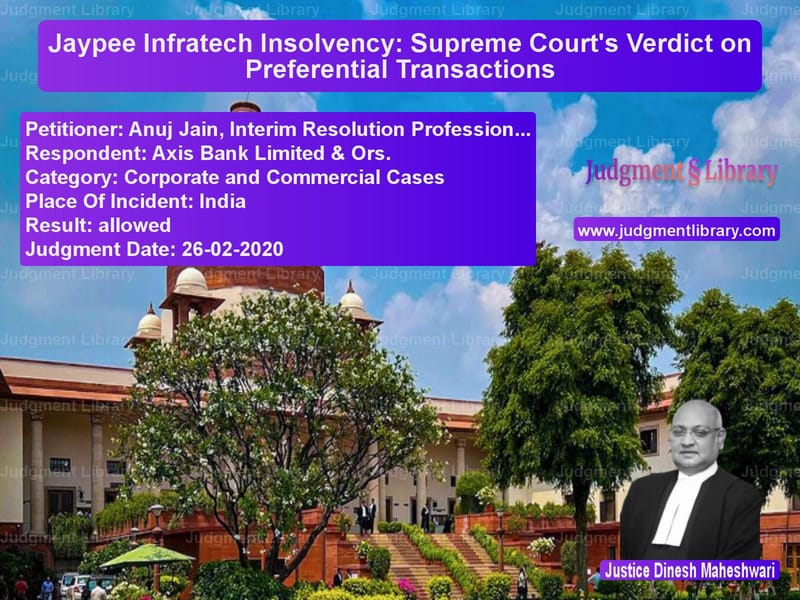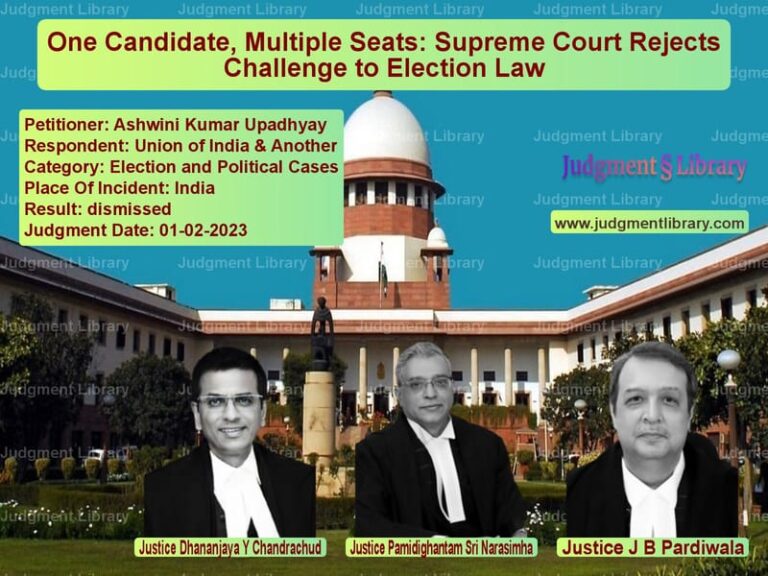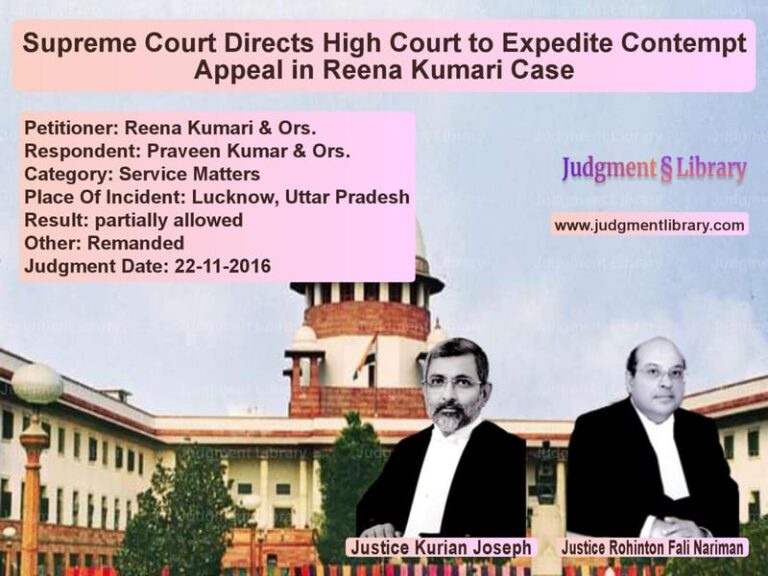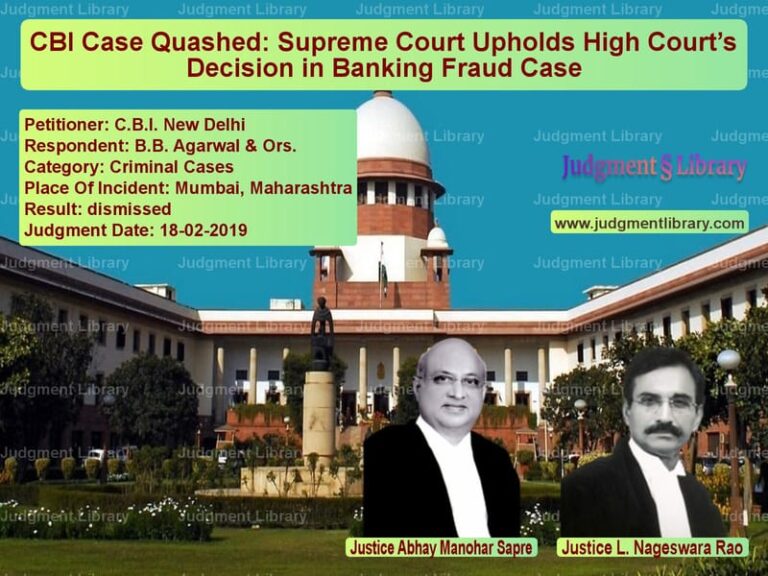Jaypee Infratech Insolvency: Supreme Court’s Verdict on Preferential Transactions
The case of Anuj Jain, Interim Resolution Professional for Jaypee Infratech Limited v. Axis Bank Limited & Ors. revolves around a significant corporate insolvency dispute concerning Jaypee Infratech Limited (JIL). The litigation primarily involved the determination of whether mortgage transactions made by JIL in favor of lenders of its parent company, Jaiprakash Associates Limited (JAL), were preferential transactions under the Insolvency and Bankruptcy Code, 2016 (IBC). The Supreme Court’s ruling in this case clarifies critical aspects of insolvency laws, including the avoidance of preferential transactions.
Background of the Case
Jaypee Infratech Limited (JIL) was set up as a special purpose vehicle by Jaiprakash Associates Limited (JAL) to execute the Yamuna Expressway Project. Over the years, JIL took loans and raised capital while JAL provided support by securing finances for JIL’s operations. However, financial difficulties arose, leading to the initiation of Corporate Insolvency Resolution Process (CIRP) against JIL under the IBC.
During the insolvency proceedings, it was discovered that JIL had mortgaged large parcels of land in favor of lenders of JAL, raising questions about whether these transactions were executed to benefit JAL at the cost of JIL’s creditors.
Legal Issues Involved
- Whether the mortgage transactions made by JIL in favor of JAL’s lenders were preferential transactions under Section 43 of the IBC.
- Whether the lenders of JAL could be categorized as financial creditors of JIL.
- Whether the National Company Law Tribunal (NCLT) and National Company Law Appellate Tribunal (NCLAT) correctly analyzed the transactions under IBC.
Petitioner’s Arguments
Anuj Jain, the Interim Resolution Professional (IRP) of JIL, argued that the mortgage transactions executed by JIL were preferential and should be avoided under Section 43 of the IBC. The key contentions included:
- JIL was already financially distressed, and its lenders had classified it as a Non-Performing Asset (NPA) at the time of these transactions.
- The transactions gave undue advantage to JAL by securing its loans while diminishing the assets available for JIL’s creditors.
- The mortgages were made within the relevant look-back period prescribed under IBC, which allows for scrutiny of transactions that may have been executed to defraud creditors.
- The lenders of JAL should not be considered financial creditors of JIL as their claims did not originate from direct transactions with JIL.
Respondents’ Arguments
The banks and financial institutions, including Axis Bank and ICICI Bank, defended the transactions by stating:
- The mortgages were created as part of the normal course of business and financial arrangements between JAL and JIL.
- There was no intention to defraud JIL’s creditors, and the transactions were legitimate financial decisions.
- As per banking norms, third-party collateral is a standard practice, and such transactions should not automatically be classified as preferential.
- The financial institutions should be considered financial creditors of JIL, as the mortgages were executed with their consent and for the benefit of both JAL and JIL.
Supreme Court’s Analysis and Judgment
The Supreme Court examined the transactions in light of Section 43 of the IBC, which defines and provides criteria for preferential transactions. The Court held:
- The mortgage transactions were preferential in nature as they were executed to benefit JAL’s lenders rather than JIL’s creditors.
- The transactions were made within the look-back period (two years for related parties) as defined under IBC, making them voidable.
- The lenders of JAL could not be considered financial creditors of JIL, as the mortgages did not create any direct financial obligation between JIL and the lenders.
- The intent behind the transactions was to secure JAL’s debts at a time when JIL was already financially distressed, thereby violating the principles of insolvency law.
Impact of the Judgment
The Supreme Court’s ruling has significant implications for corporate insolvency proceedings in India. It reinforces that:
- Preferential transactions that benefit related parties at the cost of the corporate debtor’s creditors can be avoided.
- Third-party collaterals in distressed companies must be scrutinized to prevent the diversion of assets.
- Financial institutions need to exercise greater diligence when accepting third-party security, particularly from companies undergoing financial distress.
Ultimately, the Court restored the NCLT’s decision to avoid the impugned transactions, ensuring that JIL’s assets remain available for its legitimate creditors.
Petitioner Name: Anuj Jain, Interim Resolution Professional for Jaypee Infratech Limited.Respondent Name: Axis Bank Limited & Ors..Judgment By: Justice Dinesh Maheshwari.Place Of Incident: India.Judgment Date: 26-02-2020.
Don’t miss out on the full details! Download the complete judgment in PDF format below and gain valuable insights instantly!
Download Judgment: Anuj Jain, Interim R vs Axis Bank Limited & Supreme Court of India Judgment Dated 26-02-2020.pdf
Direct Downlaod Judgment: Direct downlaod this Judgment
See all petitions in Bankruptcy and Insolvency
See all petitions in Corporate Governance
See all petitions in Judgment by Dinesh Maheshwari
See all petitions in allowed
See all petitions in supreme court of India judgments February 2020
See all petitions in 2020 judgments
See all posts in Corporate and Commercial Cases Category
See all allowed petitions in Corporate and Commercial Cases Category
See all Dismissed petitions in Corporate and Commercial Cases Category
See all partially allowed petitions in Corporate and Commercial Cases Category







